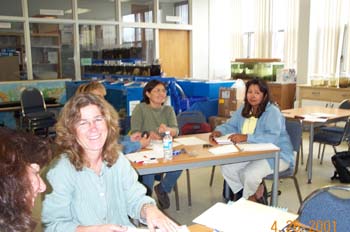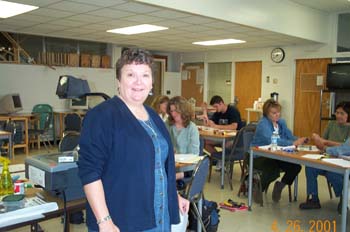* 75% of the FULL TIME UNDERGRADUATE students are under the age of 25.
· Less than 50% of the part time undergraduate students are under
the age of 25.
The following are some generalizations that you should consider as you
plan your course and decide on how you are going to teach.
Generation X
*Latch-key kids who used T.V. and video games for recreation
*Less social interaction with peers
*Sound byte, smaller attention span, more remediation needed in reading, writing, and math
*Less self-discipline, less long term setting of goals and delayed gratification
*Students of this generation are quick to proclaim their "rights" and will angrily charge complaints. (Cultural impact of "Have it your way!")
*As an instructor you may have more success if you remember an interpersonal rule: "Seek first to understand.. and then to be understood."
*You will face many students who will look at you with a blank countenance, as if they were sitting in front of a TV.
*Many of today's students perceive:
· instructors as service providers
· classroom attendance as a matter of individual choice
· grades as the reward or pay they are entitled to receive for
meeting standards that they (the students) perceive as fair.
(Instructional Generalizations)
*Most older students learn best by DOING - by applying the theory of textbooks to experiences.
*Students need experience working in small groups
*Never punish the entire group of students for the actions of the few. (fairness)
*Reduce ambiguity by providing a roadmap and contract in your syllabus.
*Once oriented to college and with some success, adult learners are typically highly motivated to succeed.
*Anticipate challenges and build these into your syllabus - our students
are adults, most of them have jobs and many of them have family responsibilities.


Students consistently need the following from their college instructors:
· Expectations of student performance that are reasonable in quantity
and quality and are consistently communicated.
· Sensitivity to the diverse demands on students and reasonable
flexibility in accommodating them.
· Effective use of class time
· A classroom environment that values students/ input and protects
their dignity
· A classroom demeanor that includes humor and spontaneity
· Examinations that address issues properly covered in class, are
appropriate to the level of the majority of students in the class, are
punctually scored and returned, and are used fairly to determine final
class grades
· Consistently positive treatment of individual students, including
a willingness to spend extra time before and after class meetings to provide
additional support.
*Shift paradigm from "sages on stage" to "facilitators of learning."
· Students thrive on feedback that is FAST - frequent, accurate,
specific, and timely.
· Ask for specific teaching resources from dept.
· Talk with professors who have successfully taught sections of
the course (e- mail or phone)
· Develop a syllabus to anticipate challenges, map out the content
and assignments, this will serve as a binding contract between you and
the students
· Plan teaching strategies
· Plan guest speakers
· Develop assessments
· Get ORGANIZED from the BEGINNING and don't change your assignments.
Articles to Read:
Program Completion Barriers Faced by Adult Learners in Higher Education.
Interdisciplinarity and integrative learning: an imperative for adult education. Ian Dinmore.